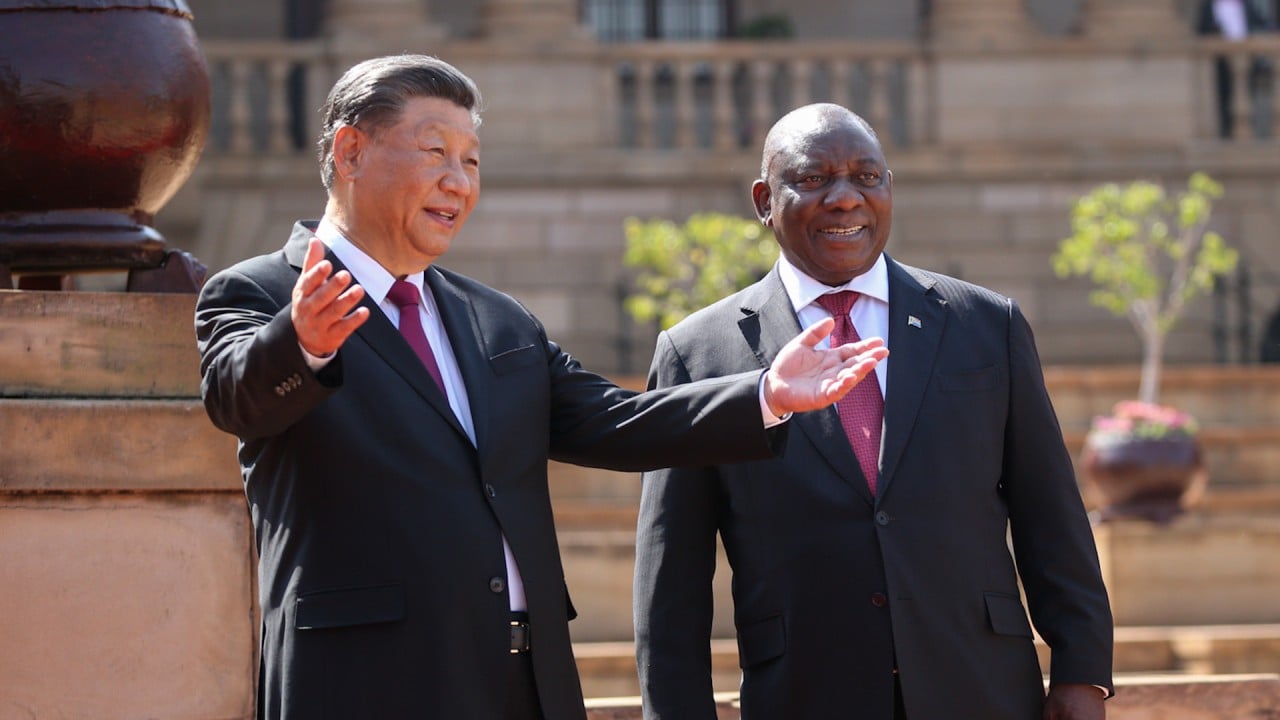
Brics expansion helps China, but bigger bloc could bring fresh risks and conflict, analysts say
- Addition of Middle Eastern and African countries reflects Beijing’s influence and extends its diplomatic reach, according to observers
- However, regional rivalries and conflicting motivations could make it hard for group to reach agreement on security and economic issues
Chinese President Xi Jinping hailed the move as “historic”, saying it showed the members’ determination to cooperate with developing countries more broadly.
“It clearly signals China’s growing influence, not only just in economic matters but in diplomatic consultations too,” Samaan said.
New Brics members boast oil, deep pockets and strategic locations: analysts
Beijing has in recent years sought to push for an alternative model of global governance, especially for developing nations, as it challenges the existing world order led by the United States.
Asked about the development on Monday, Chinese foreign ministry spokesman Wang Wenbin said Brics members did not advocate bloc confrontation and that the expansion “accords with the historical trend and the common aspiration of developing countries”.
“It will certainly promote multi-polarity in the world and greater democracy in international relations,” he said.
Having Middle Eastern and African countries join Brics would “add a further geopolitical layer” to Beijing’s reach, as the regions are key components of China’s Belt and Road Initiative, according to Alessandro Arduino, an affiliate lecturer at the Lau China Institute at King’s College London.
Arduino said the choice of new members was expected and resembled the strategy China had employed for expanding the SCO.
“The similarity to the SCO is significant and indicates that Brics is accelerating the expansion to the [Middle East and North Africa] region,” he said.
He said another example of the bloc’s Middle Eastern expansion was the UAE’s 2021 endorsement of the New Development Bank, a multilateral bank set up by Brics members to fund infrastructure development in emerging economies.
Xi in whirlwind of meetings with Global South leaders on Brics sidelines
For the six new Brics members – as well as others from the Global South that have expressed interest in joining the bloc – admission to the group would be part of a strategy to “safeguard their interests in a rapidly evolving global governance landscape”, Arduino said.
They are “essentially hedging their bets, even [for] the countries that rely on the US-led security architecture”, he said.
Samaan added that these nations did not want to end their ties with the West but were keen on “adding new options” through initiatives led by Beijing or Moscow. For example, as Saudi Arabia was in the process of joining Brics, it was also negotiating a major security agreement with Washington.
“It builds on a broader dynamic that sees Middle Eastern countries diversifying their diplomatic arrangements,” he said.
Samaan said the new Brics members were also signalling that they should be considered regional players that mattered in an evolving international environment.
If things fall apart between Riyadh and Tehran, the international entities involving both will likely be exposed to the dispute
Wang Huiyao, founder of the Beijing-based think tank Centre for China and Globalisation, said the growth of Brics showed China’s intentions to promote economic cooperation, particularly among developing nations.
“EU, China, and the US are the three largest economies and they have the responsibility and duty to help the Global South and to work together,” he said.
Samaan said a refreshed Brics configuration – one that would soon include major oil producers – could mean increased cooperation and coordination of energy policies.
According to analysts, admitting oil-rich nations was in line with the bloc’s plans to use local currencies and reduce reliance on the US dollar.
Xi and Modi agree to prioritise de-escalation efforts at Himalayan border
At the same time, countries such as Ethiopia and Argentina could benefit from the bloc’s financial frameworks, including its liquidity stabilisation fund, and gain access to credit lines for development projects, Arduino said.
But it remained to be seen what Brics could do as a bloc. While the expansion of Brics could mean broader consultations on various issues, Samaan said it did not mean that there would be greater motivation to support a common agenda.
He said the bloc looked like other multilateral initiatives primarily aimed at gathering political leaders for occasional consultations but with no capacity to follow up on specific policies.
Broadening Brics could also spell greater difficulties for the bloc to reach a common agreement on security and economic issues.
Samaan said the prevailing “multialignment mindset” among Middle Eastern countries “worked on a superficial level” in terms of diplomatic posturing, “but it gets trickier when you start discussing critical security issues” such as the US-China rivalry or war in Ukraine.
Arduino said there were already hurdles among the existing five Brics members, such as China’s complicated relationship with India, and expanding the group could introduce “more expectations and occasionally conflicting motivations”.
Recruiting both Iran and Saudi Arabia – which only this year restored diplomatic relations – at the same time could also create risks for the group.
Samaan noted that despite the China-mediated deal between the regional rivals, there had yet to be substantial progress in the resolution of the war in Yemen, and the Iranian nuclear programme has steadily advanced.
“If things fall apart between Riyadh and Tehran, the international entities involving both will likely be exposed to the dispute,” he said.
“Brics membership does not come with demand or expectation of the sort of political or diplomatic solidarity that would lead to collective action inside or outside the group,” said Zha Daojiong, a professor at Peking University’s School of International Studies. He added that the bloc did not have “clearly defined adversaries”.
“This is a difficult notion for those used to the ‘with or against’ framing of foreign policy to grapple with.”



